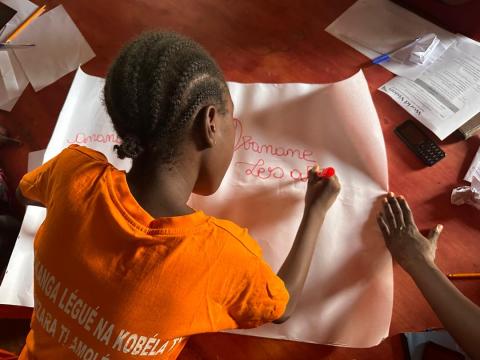Advancing advocacy for and with West Africa’s children: Turning progress into promise

By: Fedorah Pierre-Louis, West Africa Regional Advocacy Campaigns and External Engagement Advisor, World Vision International
“In this fight against hunger and malnutrition, let us be warriors, not survivors. Together, we can make ENOUGH a reality for every child.” - Thomas, a 16-year-old Youth Representative from Sierra Leone.
Thomas’ words echo the strength and determination of a generation refusing to accept hunger as inevitable. They encapsulate the heart of the ENOUGH Campaign—a bold movement launched by each of the nine World Vision offices across West Africa, aiming to end child hunger and malnutrition through local partnerships and tailored strategies.
Launching the ENOUGH Campaign across the region in 2024 signalled the start of a real movement, a rallying cry for justice and a testament to what can be achieved when nations stand together for their children. Each country adapted the initiative to address its unique challenges: Senegal engaged over 200 stakeholders in a united pledge to eradicate malnutrition; Mali amplified child-led advocacy and climate resilience; Niger mobilised grassroots ownership of solutions; and Ghana introduced sustainable school feeding and gardening programmes. Burkina Faso aligned ENOUGH with crisis response frameworks, Mauritania integrated it into national strategies for vulnerable populations, and the Central African Republic strengthened advocacy through strategic partnerships. Sierra Leone spotlighted school meals under the "Feed Salone" initiative, while Chad set an ambitious target to reach three million children by 2026.
These efforts transcend numbers—they reflect a shared determination to ensure that no child goes to bed hungry. From urban hubs to the most remote villages, the campaign has truly ignited hope and unity under one unwavering belief: every child deserves the opportunity to thrive.
Transformative wins in Advocacy
One of the most transformative victories this year was Sierra Leone’s Prohibition of Child Marriage Act 2024, which criminalises child marriage and secures a brighter future for girls. This landmark law emerged from tireless advocacy by children’s clubs, community leaders, and civil society organisations like World Vision. It is more than a legal achievement—it is a profound commitment from World Vision to sustain efforts to end violence against children in Sierra Leone and ensure they receive education, dignity, and the freedom to dream.
In Ghana, civil society coalitions mobilised thousands to demand stronger child protection systems. Events such as the AU Day for the African Child and World Day Against Child Trafficking served as powerful advocacy platforms, galvanising communities across all 16 regions and registering over 910,000 supporter actions.
At the regional level, the attempted repeal of The Gambia’s anti-FGM/C law prompted swift and unified resistance. The Joining Forces coalition of West and Central Africa, alongside local activists and international allies, stood firm in defence of girls’ rights, sending an unyielding message: harmful practices have no place in society.
Despite these wins, the challenges facing children in West Africa remain immense. Socio-political instability in the Central Sahel region has displaced millions, shuttering over 10,000 schools and leaving five million children without education. Displacement brings heightened risks of exploitation and recruitment by armed groups, particularly for vulnerable children.
Simultaneously, malnutrition casts a long shadow across the region. School meal programmes—often a lifeline for children—struggle to meet rising needs, while the impacts of climate change further strain fragile food systems.
Heading into 2025, the call to action is clear: we must deepen our commitment to advocacy, amplify the voices of children, and address the root causes of their struggles—conflict, hunger, and instability. Expanding sustainable solutions like school feeding programmes can transform lives and restore hope. The children of West Africa are not just mainly affected by the contextual challenges; they are at the heart of the solutions we must pursue.
Guided by Isaiah 1:17—'Learn to do good; seek justice, correct oppression'—we reaffirm our commitment to ensuring every child thrives. Every law passed, campaign action implemented, and partnership strengthened this year reflects a commitment to their potential and well-being.